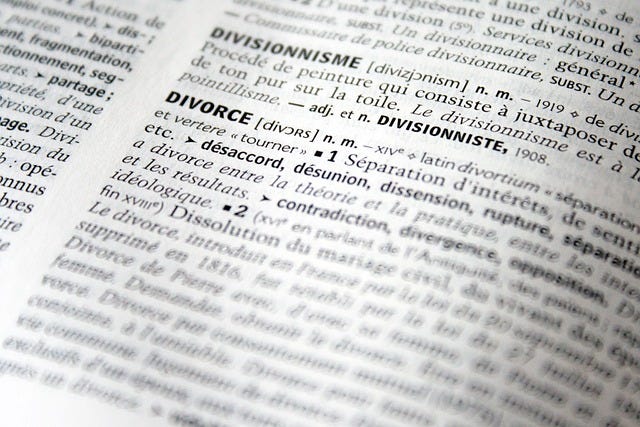Divorce is a very complex and emotionally overwhelming process, so navigating through all the necessary legal procedures at that time can be challenging, especially if you are in a foreign country. In Israel, the divorce process is regulated by civil and religious laws, making it rather unique. This guide will help you familiarize yourself with the divorce process in Israel, focusing on key legal requirements, procedures, considerations, and other relevant information you need to know.
Step 1: Understanding the Legal Framework
Getting a divorce in Israel is different for Jewish, non-Jewish, and mixed couples. Jewish couples’ marriage is heavily influenced and regulated by religious laws, Jewish law – Halacha in particular, and the jurisdiction over marriage and divorce is held by the Rabbinical Courts. This implies that even couples that are married abroad must obtain their religious divorce in Israel.
On the other hand, non-Jewish and mixed couples may have their cases governed by civil courts or other religious tribunals.
Step 2: Initiating the Divorce Process
The first formal step in the process is filing for divorce, however, the grounds for the divorce are very different in Israel compared to other countries. Hiring a legal professional specializing in family law is highly advised to ensure the petition is correctly drafted and filed. For Jewish couples, the filing for divorce is also known as Gittin. The divorce needs to be based on certain grounds, such as adultery, impotence, infertility, abusive behavior, and other serious reasons. However, the law also recognizes mutual consent as a valid ground for divorce.
The initiator of the divorce, or the petitioner, must submit relevant documents, including the marriage contract – Ketubah, and an outline of grounds for divorce. This is why it’s important to hire a divorce lawyer familiar with family law in Israel who can help you draft this correctly.
Step 3: The Role of Mediation
An inevitable part of the divorce process in Israel is mediation sessions, where couples are encouraged to reach a mutual agreement on various important issues, such as child custody, alimony, property division, etc. The goal of these sessions is to help couples solve important matters in a cost-effective and timely manner. Solving these issues in court battles would take too much time and money from both parties.
If the mediation sessions are successful, the couple proceeds to draft a divorce agreement that is submitted to the Rabbinical Court for approval. Once it’s approved, the court issues a divorce decree which formalizes the end of the marriage contract.
Step 4: Court Proceedings
In case mediation sessions are unsuccessful, the case goes directly to the Rabbinical court. Each side will have a chance to present their case, and the court will make the final decision regarding the issues parties couldn’t agree on. When making a decision, the court strongly takes into consideration the religious law, but also civil law principles (especially when it comes to child support and custody).
When it comes to the divorce of Jewish couples, the husband is required to grant the wife a Get, which represents a religious divorce document. Without this document, the wife cannot remarry within the Jewish faith. Non-Jewish and mixed couples are not obliged by this. The court cannot grant the Get but can impose sanctions on the husband (financial, penalties, and even imprisonment) to compel him to issue the Get.
Step 5: Child Custody and Support
Custody and guardianship of the child are two different terms in Israel. Both parents hold guardianship of the kids, and they are granted this right by birth. Guardianship means that both parents are responsible for the kid’s well-being, education, health, etc. On the other hand, custody refers to the kid’s sleeping arrangements and place of residence.
Custody can be sole custody (granted to one parent) or joint custody (shared between both parents). Practice shows that children under the age of six are automatically placed under the mother’s care (Tender Years Doctrine). Of course, each case is evaluated separately.
Child support is determined after the evaluation of the child’s needs and the financial capabilities of both parents. The non-custodial parent is usually required to pay for child support. The exact amount is determined by the court at the moment of divorce. Some of the factors that influence the amount are income, standard of living, children’s specific needs, etc.
Step 6: Division of Property
Division of property after a divorce is regulated by Israel’s Spouses’ Property Relations Law. This law says that all property accumulated during the marriage is subject to equal division between husband and wife, regardless of the name on the title deed. Property obtained before marriage or through inheritance is not included in the division.
The couple can come to a mutual agreement before filing for divorce, or during mediation sessions. However, if the couple can’t reach an agreement, the case is presented to the court, where principles of fairness and equity are in the ruling. The court will make a decision about the division of real estate, savings, investment, and other assets the couple may have acquired during the time of their marriage.
Step 7: Alimony
Spousal support, or alimony, is one of the key issues addressed during the divorce proceedings. The husband may be required to pay his former wife if she’s unable to support herself. However, in recent years, there has been a trend towards more balanced financial responsibilities between spouses, meaning that the court recognizes that both parties need to contribute to their post-divorce financial independence.
If alimony is granted, the amount and the duration of the payments are also determined by the court, and based on the length of the marriage, the wife’s current financial situation, her ability to earn income at the moment of divorce, and the near future, etc.
Step 8: Finalizing the Divorce
Once all issues have been resolved, either through mediation or court rulings, the Rabbinical Court will issue a final divorce decree. This decree officially ends the marriage. For Jewish couples, the husband must deliver the Get to the wife in a formal ceremony, which is then registered with the Rabbinical Court.
If the divorce involves a civil aspect, such as the division of property or custody arrangements, these matters are also finalized under the court’s rulings. It is important to ensure that all agreements and court orders are legally binding and enforceable to avoid future disputes.
Step 9: Post-Divorce Considerations
After the divorce, both parties are familiar with their rights and obligations concerning child custody, child support, alimony, etc. If some major change in circumstances happens, it may be necessary to revisit the arrangements and make new ones.
On the other hand, both parties should not disregard the emotional side of the divorce, so both of them should seek support if needed. Divorce can be very challenging, so counseling or support groups can be beneficial at that time.
Conclusion
The divorce process in Israel is a multi-faceted journey that requires careful navigation through both religious and civil legal systems. Understanding the steps involved, from filing for divorce to finalizing agreements on child custody and property division, is essential for ensuring a fair and just outcome. By seeking legal advice, considering mediation, and being informed about your rights, you can approach the divorce process with greater confidence and clarity.













